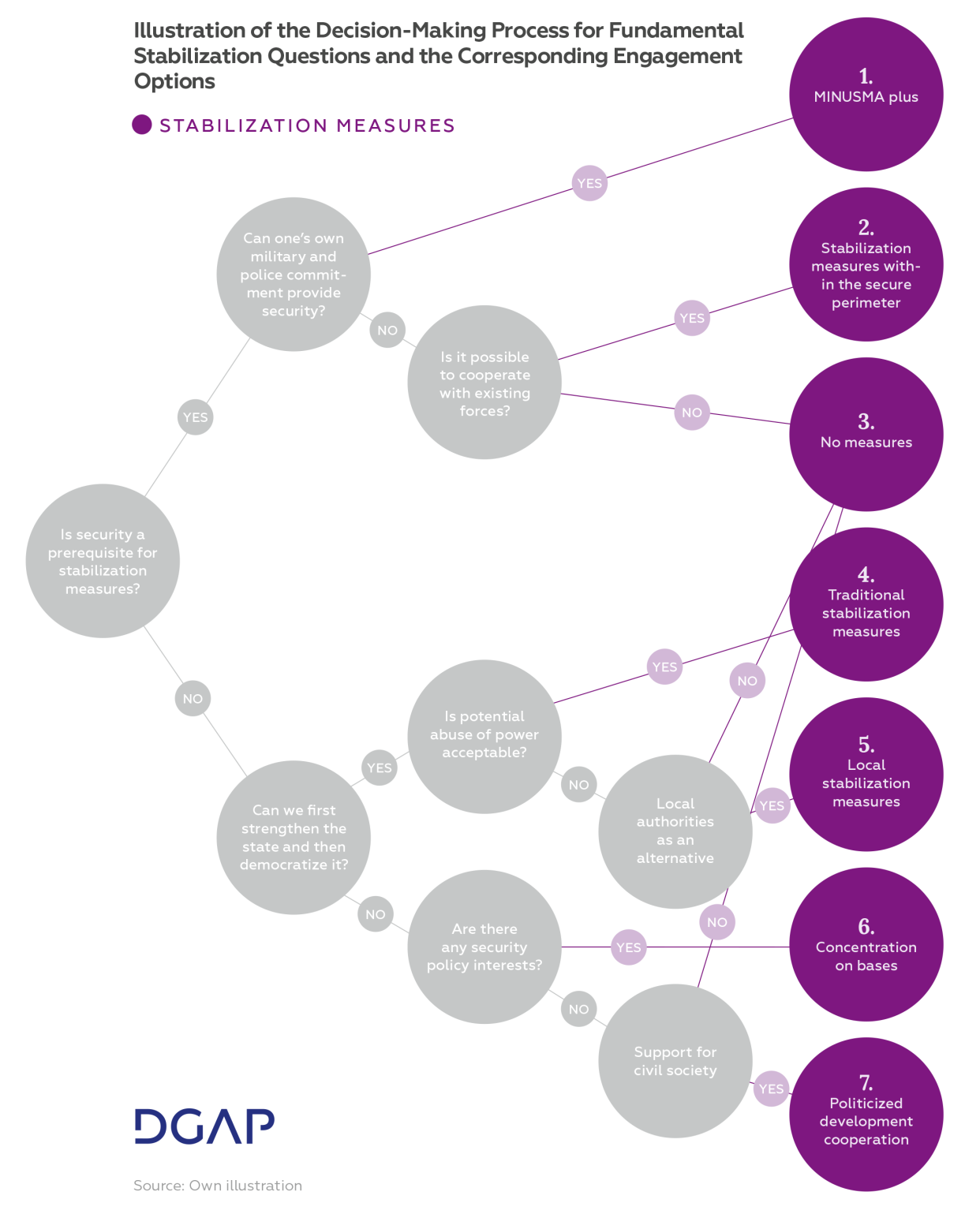| Legitimate partners: The German stabilization strategy provides no indication of what constitutes a legitimate partner in practice. Germany should define clear criteria. |
| Local expertise: Decisions for or against cooperation are always case-dependent. However, there is a lack of local expertise for making these context-specific decisions. Germany should therefore invest strategically in local expertise. |
| Foundations: The German strategy needs more clarity regarding the foundations of future stabilization policies, especially with regard to the classification of security cooperations between coup governments and Russia. |
You can download the French version of the analysis here: Politique de stabilisation au lendemain des coups d’État au Sahel
You can download the German version of the analysis here: Stabilisierungspolitik nach den Coups im Sahel
Executive Summary
Germany, the Netherlands, the United Kingdom, and the United States pursue similar strategies as part of their stabilization policies. These parallels have so far been particularly evident in the Sahel, where the partners cooperated closely until the recent military coups, especially those in Mali and Niger. However, since the coups – in Mali in 2020 and 2021, in Niger in 2023 – the stabilization actors have been faced with a dilemma: on the one hand, they do not want to cooperate with the new military governments due to a lack of democratic principles. On the other hand, they do wish to continue pursuing their interests in the region in the areas of stability and values, for instance, with regard to democratic governance and respect for human rights. Since stabilization is aimed directly at statehood and political processes, the seizure of power by putschists and the conditions in the Sahel region complicate the stabilization efforts of Germany and its partners. This raises the following questions:
- What are the basic priorities of the respective stabilization strategies?
- What are the specific priorities in the event of a coup?
- And what does this mean for future strategies?
Initial Situation
Coups Present Challenges to Cooperation on Stabilization
Stabilization as a foreign policy instrument aims to strengthen legitimate state structures and political processes in order to mitigate the effects of conflict in the short term and avoid further conflict in the long term. This is a risky undertaking, as stabilization is meant to work in fragile and high-risk conflict environments. Over the last ten years, Germany in particular has expanded the focus of its stabilization efforts in the Sahel countries. The results of these engagements are mixed: while success in Mali was rather limited even before the coups, in Niger, positive developments were observed. However, the coups of recent years have made cooperation considerably more difficult and pose a major challenge for stabilization actors, by their very nature calling into question the legitimacy of the state structures that are to be strengthened. This leads to a dilemma: should stabilization efforts now be pursued all the more – or have they in fact been stripped of their foundations?
This study examines the stabilization strategies of Germany and some partners with similar concepts – the Netherlands, the United Kingdom, and the United States – concentrating on their approaches during the coups in Mali in 2020/21 and Niger in 2023. The aim is to analyze the priorities of various Western states in the event of a coup, both in theory and practice, and to compare these with the original goals of stabilization. Based on this, suggestions are formulated to guide future actions of policymakers.
Recommendations
Germany and Its Partners Need Clear Goals
The strategies of the stabilization actors mentioned are intended to enable coordinated effects, but they differ greatly in key aspects. In particular, country-specific priorities and the different assessments of legitimate statehood lead to strategies that do not always allow for aligned action. Although the first coup in Mali in 2020 was publicly condemned by all of the actors examined, it hardly led to any practical consequences.
The reaction of the stabilization actors to the coup in Niger in 2023 was much harsher but still did not produce the desired return of the old regime. It took the stabilization forces months to realize that their approach had failed. Their reaction to the coups changed considerably over the period under review, while their strategy papers remained unaltered.
As a result, the reactions of Germany, the Netherlands, the United Kingdom, and the United States following the coups often did not correspond to the previously agreed stabilization goals. Above all, coups pose a major challenge to the goal of supporting legitimate statehood. The actors assess the factor of legitimacy very differently, focusing on aspects such as the form of government, the government’s specific approach, or popular approval. Moreover, all these assessments are based on shaky foundations. For instance, one might ask: if popular approval can strengthen the legitimacy of a coup government, how can it be measured? No clear criteria and reliable data are available in this area.
The German Government Should Define Its Goals More Clearly and Build Up More Local Expertise
Germany and its partners rightly see themselves as like-minded stabilization actors, as they pursue comparable political approaches to shared values and interests. Another commonality, however, is that neither of them defines clear criteria as to what constitutes a legitimate government in the operational region of their stabilization measures. The countries should urgently define these criteria: individually, and ideally also in a joint declaration of intent. The Stabilization Leaders Forum, which the actors already use for mutual exchange, represents a suitable platform for this effort.
A crucial question in this context is what to prioritize after coups: security or the restoration of democratic processes? As much as the actors would like to achieve both of these goals at the same time, previous experience shows that they have to make a choice.
A better understanding of local conditions through local networks is also crucial. This not only helps assess the acceptance of a coup among the population but also generally contributes to addressing the specific context of stabilization measures. Instability in a region should not be an excuse to lose track of the situation but rather a reason to invest heavily in local knowledge and language skills. In volatile conflict situations, it is impossible to keep a close eye on everything, but better strategic positioning can improve the assessment of motives for action and help to adapt appropriate responses.
Finally, more clarity is needed on Germany’s actual priorities in the area of stabilization. Based on an evaluation of texts and interviews, the present analysis identifies the key issues relevant for stabilization measures after coups. The decision tree designed for the study (page 35) is intended to serve as a starting point for an urgently needed debate. Assuming the primacy of security, it tries to shift very complicated issues from being merely considered to being acted upon.
Explainer Video
In this video, our Research Fellows Florence Schimmel and Marco Schäfer delve into the recent coups in Mali and Niger, exploring the broader implications for stabilization efforts.
Podcast on the topic
“Stabil diskutiert” is a four-part podcast series on security policy in Germany, which explores the question of how Germany can better contribute to preventing crises and creating stability in the foreign policy environment.





